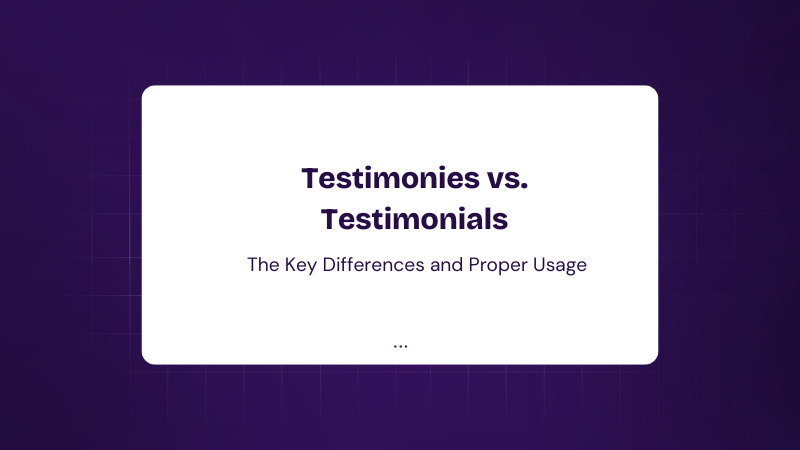The Confusion We Never Knew We Had
Let’s be honest—until today, you probably didn’t lose sleep over the difference between “testimonies” and “testimonials.” But now that you’re here, it’s suddenly the most important thing ever. Is it “customer testimonies” or “customer testimonials”? Do businesses use one, and courts use the other? Are they interchangeable, or is there a secret grammar rule that no one told us about?
Strap in, because we’re about to settle this debate once and for all.
Testimonies vs. Testimonials: Breaking Down the Definitions
Before we start picking sides, let’s define the terms properly.
What is a Testimony?
A testimony is a formal statement or declaration made by a person, usually in a legal, religious, or personal setting. It’s used to express experiences, beliefs, or facts based on firsthand knowledge.
Common Uses of “Testimony”
- Legal Setting: Witnesses provide testimony in court.
- Religious Context: People share testimonies of faith and spiritual experiences.
- Personal Accounts: Someone might give a testimony about overcoming adversity.
For example, if someone says, “I swear I saw a UFO land in my backyard,” that would be a testimony (whether or not anyone believes it).
What is a Testimonial?
A testimonial, on the other hand, is a statement of support or endorsement, often used in business and marketing. It’s when a person shares their positive experience with a product, service, or company.
Common Uses of “Testimonial”
- Marketing and Business: Companies display testimonials from happy customers.
- Endorsements: Celebrities or influencers provide testimonials for brands.
- Professional Recommendations: A former boss writes a glowing testimonial for an employee on LinkedIn.
For example, if someone says, “This face cream made me look 10 years younger in a week!”—that’s a testimonial (and possibly an exaggeration).
The Key Differences Between Testimonies and Testimonials
| Feature | Testimony | Testimonial |
|---|---|---|
| Definition | A formal statement of personal experience or belief | An endorsement or review supporting a product, service, or person |
| Context | Courtrooms, religion, personal experiences | Business, marketing, personal recommendations |
| Tone | Serious, factual, personal | Persuasive, positive, promotional |
| Example | “I witnessed the accident and can confirm what happened.” | “This law firm helped me win my case—highly recommended!” |
So, if you’re reviewing a company on Yelp, you’re giving a testimonial. If you’re speaking under oath in court, you’re giving a testimony. See the difference?
Why Do People Confuse Testimonies and Testimonials?
The mix-up happens because both words involve personal statements. But here’s the catch:
- Marketing Has Blurred the Lines
Many businesses use “testimonies” when they really mean “testimonials.” Saying “customer testimonies” makes it sound more authentic, even though “customer testimonials” is the correct term. - Both Come from the Same Root Word
Both terms derive from the Latin word testimonium, meaning evidence or proof. Over time, “testimony” stuck with legal and religious use, while “testimonial” evolved into an endorsement term. - Regional and Contextual Variations
Some cultures and industries use the words more loosely. For example, in some religious communities, testimonials are used to describe faith-based personal stories, even though the more precise term is testimonies.
The Power of Testimonials in Business and Marketing
If you’re in business, testimonials aren’t just useful—they’re essential. Studies show that:
- 92% of consumers trust testimonials and online reviews as much as personal recommendations.
- Businesses that use testimonials see a 62% increase in revenue per customer.
- Adding a testimonial to a landing page can boost conversions by 34%.
Where to Use Testimonials Effectively
- Website Homepages – Showcase glowing customer reviews front and center.
- Product Pages – Reinforce buying decisions with positive feedback.
- Social Media – Use video testimonials for maximum impact.
- Emails & Ads – Personal stories build trust and improve click-through rates.
Can Testimonials Be Fake? (And How to Spot Them)
Unfortunately, yes. Some businesses fabricate testimonials to boost sales. Here’s how to tell if a testimonial is fake:
✅ Too generic – “Best product ever! 10/10.” (No details? Suspicious.)
✅ Stock photo alert – Reverse image search the person’s picture.
✅ Identical wording across platforms – If the same review appears on multiple sites word-for-word, something’s off.
✅ No last names or specifics – If all testimonials come from “John D.” or “Sarah P.,” they might not be real.
To maintain credibility, businesses should encourage genuine customer testimonials and avoid fake or exaggerated claims.
Final Verdict: Which Word Should You Use?
If you’re talking about formal statements of personal experiences, use testimonies.
If you’re referring to endorsements for a business, product, or person, go with testimonials.
Quick Memory Hack
- Testimony = Truth (court, religion, personal experiences)
- Testimonial = Trust (business, endorsements, marketing)
So, next time someone says, “Can I give a testimony about my favorite restaurant?”—you can confidently correct them
FAQs
Can testimonials be used in court?
No. In court, a person provides a testimony, not a testimonial. A testimonial is a recommendation, while a testimony is a sworn statement of facts.
Are testimonials legally binding?
No, testimonials are just opinions or endorsements, not legally binding statements.
Can a testimony be positive or negative?
Yes, a testimony can be positive or negative, as long as it reflects a real experience. A testimonial, however, is almost always positive because it’s meant to promote something.
Is “customer testimonies” correct?
No, the correct term is “customer testimonials” since they are endorsements, not formal statements of truth.
Do testimonials work better than ads?
Yes. Consumers trust testimonials more than traditional advertisements because they come from real people, not companies.
The Next Time Someone Mixes Up These Words…
You’ll know exactly how to correct them (politely, of course). Understanding the difference between testimonies and testimonials isn’t just about grammar—it’s about using the right word in the right context.
So, whether you’re giving a heartfelt courtroom testimony or raving about your new favorite gadget in a testimonial, just remember: one is about facts, and the other is about persuasion. And now, you’ll never mix them up again.



